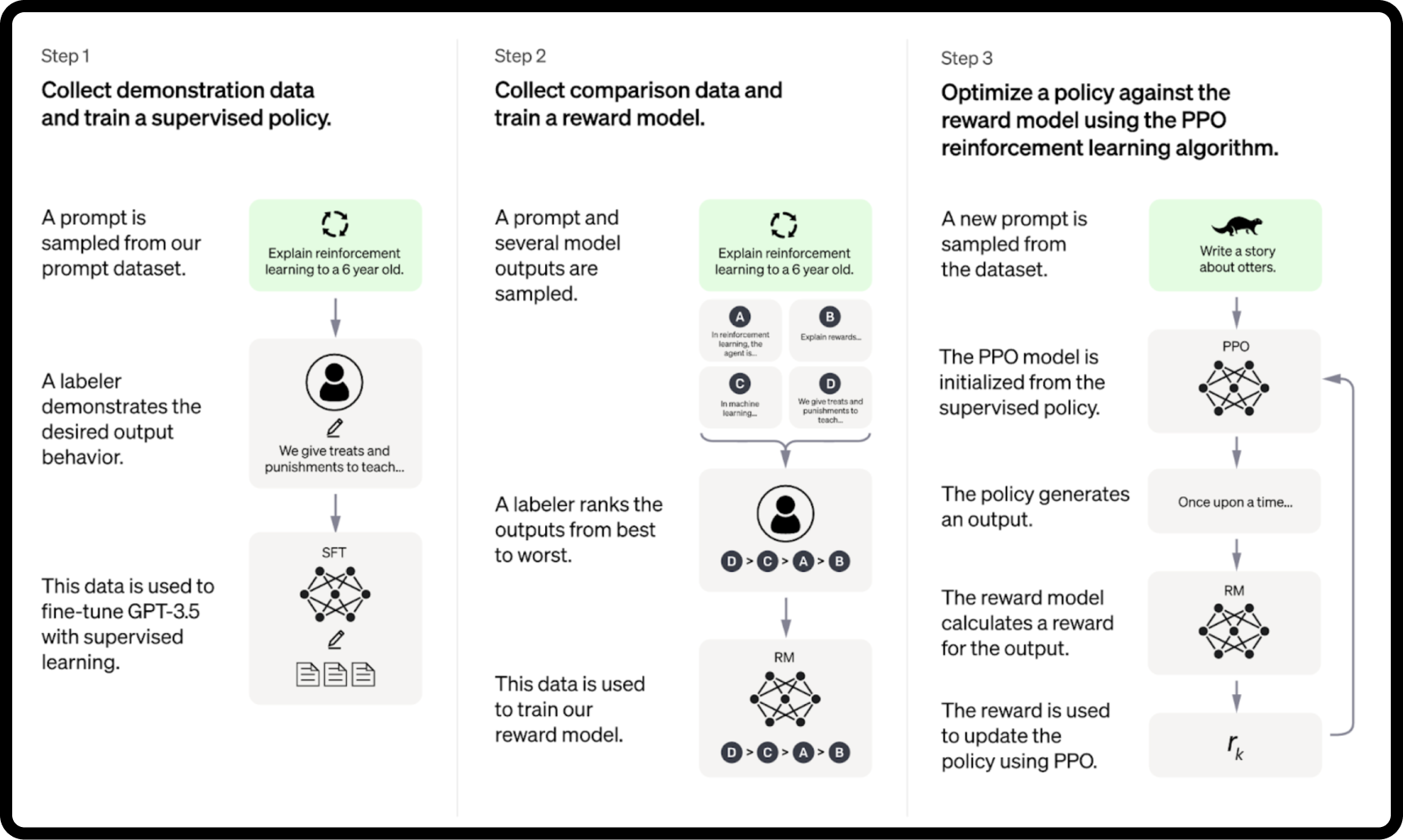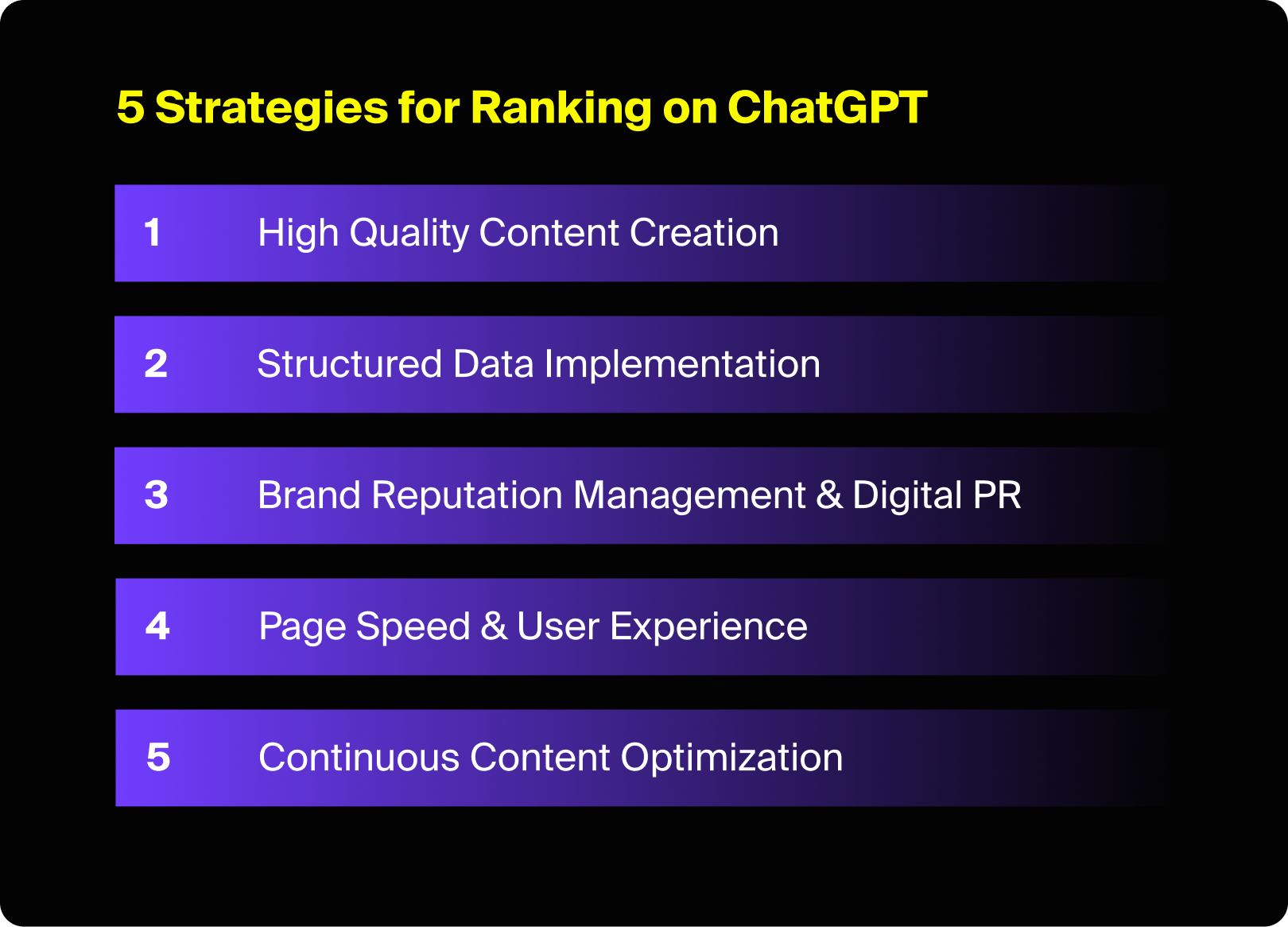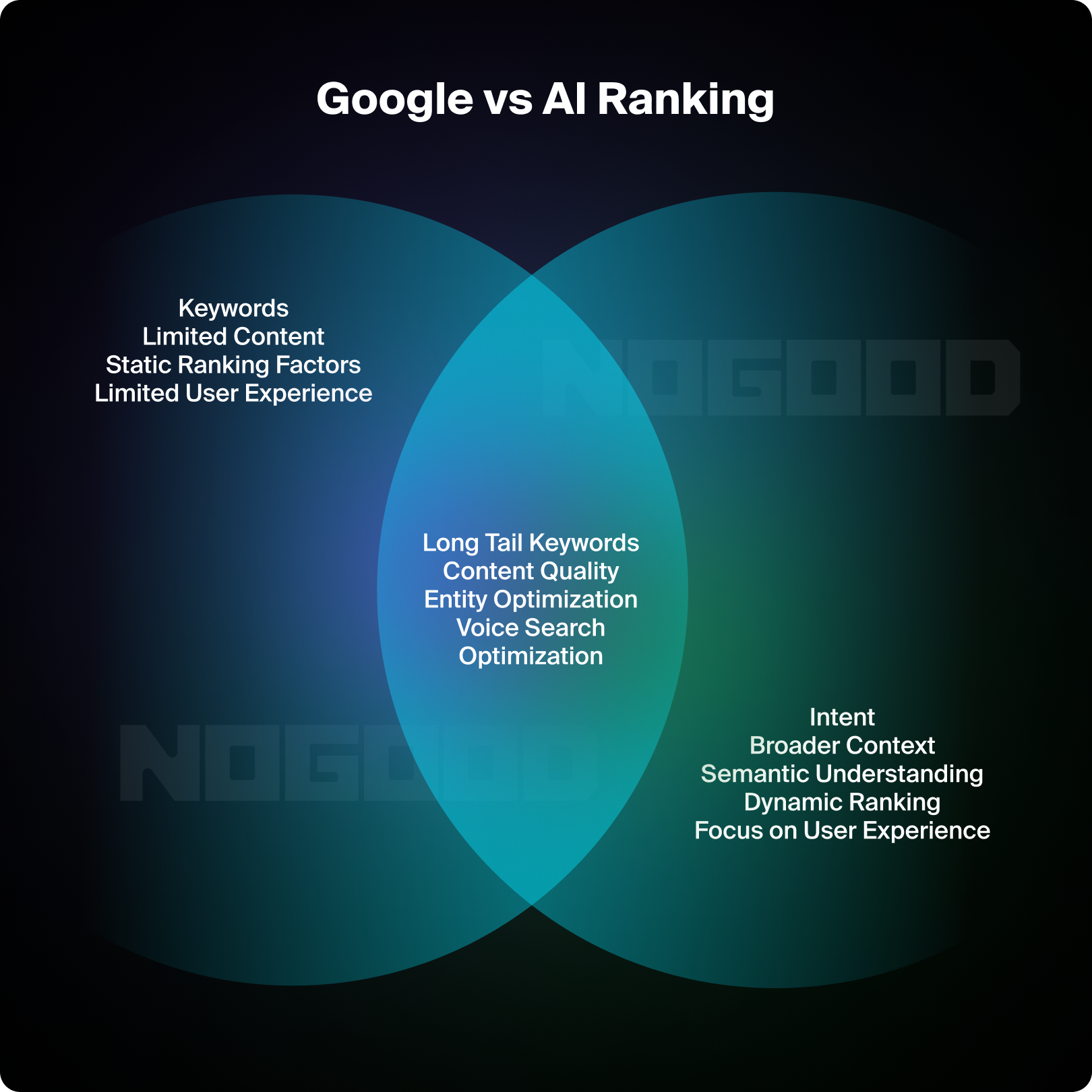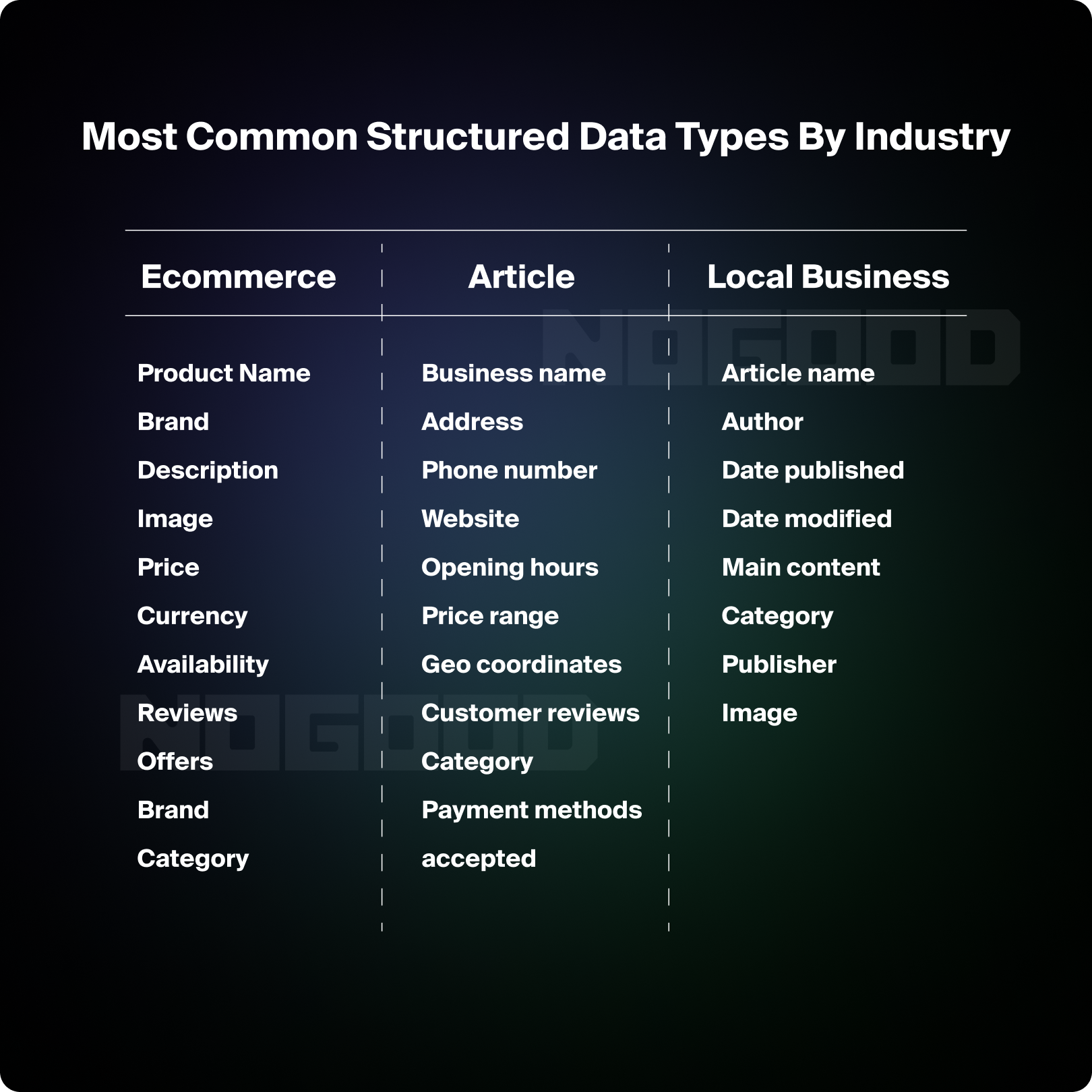The AI search revolution is already in full swing, and more and more marketers are wondering, how can I get featured on ChatGPT? The good news is that there is a solution. The bad news is you’re competing with everyone under the sun for a small sliver of search real estate. So the question isn’t how to rank, it’s how to out-rank your competition.
In this blog post, we break down everything you need to know about how ChatGPT serves results and what strategies to employ to get featured.
Get Your Website Ranking on ChatGPT
How does ChatGPT rank website content?
ChatGPT relies on Bing’s search index and ranking algorithms to retrieve and prioritize content. If your site isn’t crawlable, indexed, and optimized for Bing, it likely won’t appear in ChatGPT responses.
ChatGPT doesn’t necessarily rank pages in the same way search engines do. What search engines and ChatGPT share is their need for well-written content. Search engines have continuously moved toward attempting to create a more honest search ecosystem by the means of human-written, helpful content. ChatGPT is the same way.

ChatGPT looks for authoritative sources that accurately represent and provide value to the user’s question. Accuracy and relevance play a big role in who gets served in a ChatGPT result. Having a well-organized piece of content is the foundation of ranking on not only search engines, but more importantly, ChatGPT. So, if ChatGPT isn’t necessarily ranking content, how do they determine what content gets served?
1. Authoritative Sources
The first thing ChatGPT will take into account when auditing sources is the authority of that source. If you’re a reliable source, you’re more likely to be visible in their results.
Authority can mean a lot of things. It can be tied to the author, the domain the content lives on, or be based on external factors like mentions and backlinks. Being known as an authoritative source doesn’t happen overnight, but there are certainly things that can be done to improve your standings.
2. Accuracy and Fact-Checking
High-quality content is factual content. ChatGPT is looking for the most updated information not only to properly inform its users, but also to make sure it reduces the spread of misinformation.
The move toward a more honest web puts pressure on these AI systems to remain unbiased and facts-based. ChatGPT’s integration of a search feature can be clicked by the user or, when applicable, chosen by the model itself to ensure the information provided is correct. ChatGPT has a responsibility to accurately represent content and interpret things in a meaningful way that doesn’t change the meaning of the original content or information.
3. Relevance and Depth
Relevance and depth allows the AI to be specific. Relevant and deep content improves user satisfaction, as it meets their informational needs. AI models like ChatGPT use algorithms to understand the context of a query and match it with relevant information.
Content that is both relevant and deep is more likely to be used by AI because it can effectively answer user queries. AI systems prioritize content that directly addresses the user’s query in a meaningful way. This satisfaction can lead to repeat visits, shares, and citations, further establishing the source as authoritative.
4. Clear and Structured Writing
It almost goes without saying that a clear and well-structured piece of content is a must. The easier content is for these systems to understand, the faster and more likely they will be to serve your content as a part of their answers. Not only does the structure matter, but so does the order in which the ideas are presented.
Make sure you’re properly aligning your content in a way that the user would expect or need to understand. For example, if you’re creating a marketing campaign for a new skincare product, you’ll want to highlight the key benefits before diving into the scientific ingredients.
5 Strategies for Ranking on ChatGPT

1. High-Quality Content Creation
With ChatGPT using different aspects of quality content as the basis for serving answers, it’s no surprise this suggestion tops our list. We’ve talked about what it means to have quality content, but we wanted to break it down into steps to make it easy:

- Effective Use of Keywords: While ChatGPT isn’t necessarily ranking content based on keywords, incorporating keywords naturally throughout your content is only going to increase visibility. Perform keyword research as you normally would but focus on keyword intent.
- Content Structure & Readability: Structure your content with clear headings, subheadings, bullet points, and concise paragraphs. Proper structure makes it so users and AI search engines alike can easily understand and flow through the information. Easy-to-understand content will drive engagement rates, which will only help your chances of being surfaced in ChatGPT.
- Natural Language Processing: Write in a conversational tone that mimics natural language. In short, write like you speak. Approaching content in this way aligns with how ChatGPT and other AI models understand and repurpose your content.
- Reverse Engineer User Intent: Understand and anticipate what users want when they ask questions. Tailor your content to provide direct answers, detailed explanations, or step-by-step guides that align with common user intents.
You can build authority on Bing by updating the author’s bio’s on your website. These short snippets signal to Bing that the author has expertise and experience in the topics they are writing about.
2. Structured Data Implementation
Structured data is the gateway to clear information understanding for AI models. Structured data enhances your content visibility and relevance and allows these models to more easily surface information that would otherwise take them additional time to understand. When we’re talking about AI search engines, every second counts. Information comprehension is arguably the most important mechanism of these models.
Structured data can be implemented in several ways, depending on your website’s setup and your preferred method. If you’re unsure which approach is best, consult your developer to determine the most effective solution.
Here are some common implementation options:
- Manual Coding – If you prefer coding directly on your site, you can add schema markup manually using specific tags and attributes.
- Plugins – Content management systems like WordPress offer plugins that streamline the structured data process. It’s essential to verify that the schema is correctly formatted and remains up to date, as schema requirements frequently evolve.
- Data Feed Manager (eCommerce) – For websites with extensive product feeds and multiple categories, custom solutions can help implement structured data efficiently.

3. Brand Reputation Management and Digital PR
Bing uses social media signals to inform its algorithms, meaning content that performs well on social media will boost website rankings if the account is linked to that page. To take advantage of this, you can share content seamlessly across platforms.
If a particular YouTube video is going viral with likes and comments, then embed that post into one of the blog posts on your website. Conversely, if you write a highly authoritative blog your Instagram audience would find interesting, then share the link in your next IG post.
Having a positive brand sentiment isn’t as easy as it once was. With more ways to share feedback brands have to be on the lookout for negative reviews and brand reputation. ChatGPT and Bing’s algorithms look at customer reviews to determine user sentiment about your brand. These reviews influence how your brand will be featured in AI search results.
Here are some ways to help maintain a positive reputation:
- Guest Post on High-Authority Sites
- Highlight Industry Awards and Recognition
- Engage in Influencer Marketing for Brand Amplification
- Build partnerships with Affiliate sites for Awards & Listicles
- Post and Respond on Forums & UGC Platforms (Quora, Reddit)
- Promote Positive Mentions on Authority Websites
- Encourage Positive Product or Service Reviews From Happy Customers
Having a cohesive brand reputation plan means monitoring and responding to reviews, nurturing strategic publisher partnerships, and earning links from valuable websites. While backlinking is still a thing, it isn’t as impactful as it once was. Search engines have progressed beyond simple backlink profiles and use more signals from across social media and external sites to create their own view of your brand.
4. Page Speed and User Experience
Page Speed and user experience go hand in hand. Having a responsive site with a well-optimized user experience only improves your chances of both ChatGPT and traditional organic listings.
A better user experience backs into better engagement metrics. When you have better engagement metrics, this is a signal to search engines that users are having a positive experience with your content.
Indexing in Bing for ChatGPT Visibility
To ensure your content is being indexed by Bing, sign in to Bing Webmaster tools and ensure your site map is uploaded correctly. Check the Site Explorer within the tool to make sure all of your web pages are being indexed. If Bing can’t find and crawl your pages, ChatGPT won’t be able to serve information from them.
5. Continuous Content Optimization
Keeping content fresh is the name of the game. Having a recent publish date on your post might do more than you think. Republishing stagnant content isn’t just a benefit for you from a traffic perspective, but it’s a benefit for users, too.
Having frequently updated content shows that you’re incorporating new emerging details and optimizing your content to better align with user intent. Try to stay away from the traditional SEO mindset in these updates. It can be easy to slip into a routine of optimizing each page on your website the same way. While this can make the process more streamlined, it doesn’t allow you to adapt to algorithm changes and user intent. It’s best to infer as much as you can from the data you’re collecting so that you can tailor the content to appease the user intent and algorithm updates.
Don’t Fight the AI Search Battle Alone
When it comes to ranking in ChatGPT or AI search engines, it can be a lot to take in and attempt to put into practice. A lot of the advice boils down to generating honest content that’s aligned with search intent. That’s truly the basis for ranking in these systems. If you keep the user in mind, you’ll be able to break into the search results of ChatGPT.
Here at NoGood, we specialize in AI search engines and AEO so that you can get ahead of the curve and future-proof your content marketing efforts. If you want to learn how we can help you achieve your goals, let’s talk!






